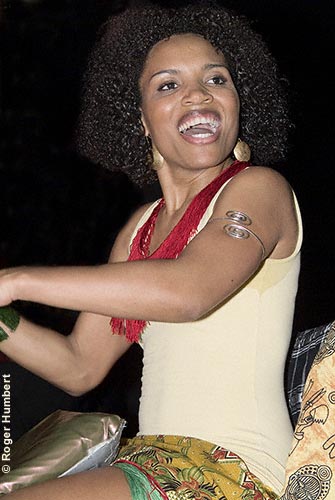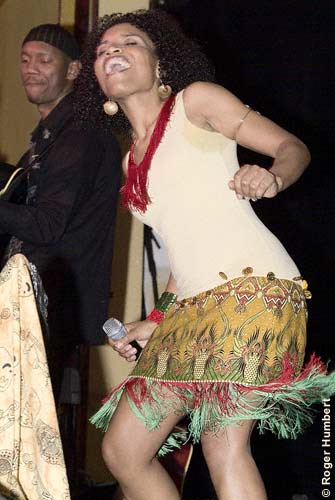|
The lights are dimmed The band starts playing. Intricate, driving rhythmic patterns are punctuated by shouts and claps from the capacity audience.
Suddenly, Lura appears. A few quick fluid dance steps bring her to the edge of the stage. Our incantations have summoned her from some otherworldly realm. She stands before us — lithe and barefoot. The radiance of her smile — of her whole being — washing over us.
Under her direction, the music intensifies. Lura starts singing, swaying with the rhythm — what a voice! A graceful twirl, arms flung high, hips sensuously gyrating — with confidence and ease she luxuriates in her power. At her feet: an electrified audience stands absolutely captivated, eager to share in Lura’s gift of music.
Who is this enchantress?
Maria de Lurdes Pina Assunçao was born in 1975 to an expatriate Cape Verdean couple living in Lisbon, Portugal. Lura’s singing career started when she was seventeen. She was a dancer at the time Juka, a singing star of African music in Lisbon, asked her to appear on his new album. Lura, who was originally supposed to sing backing vocals, was asked by Juka to perform a duet with him. Juka’s zouk was a hit.
In the wake of this first success, Lura worked with several other Portuguese speaking African celebrities (among them Bonga from Angola and her fellow countrymen Tito Paris, Paulo Florès and Paulinho Vieira).
Lura was working with a theatre company when she made her first solo album — a syrupy offering aimed at the discotheques. It was not until 2004 that Lura made a truly Cape Verdean record: Di Korpu Ku Alma (Of Body and Soul).
Lura’s Portugese/West African sound is quite different from that of her Cape Verdean countrywoman, Cesaria Evora. Evora's style is that of the lilting morna of her home island, Sao Vicente. Lura's music is rooted in Santiago, the most African of the ten islands that comprise the Cape Verdean archipelago. The indigenous bataku rhythm of Santiago is more insistent and varied than the mellower morna.
Updated and spiced up with contrasting dashes of urban pop and flamenco-tinged fado, Lura's Afro/European fusion really comes alive on stage.
|




